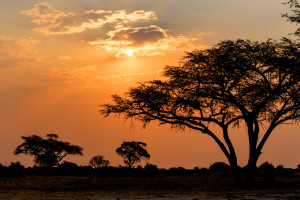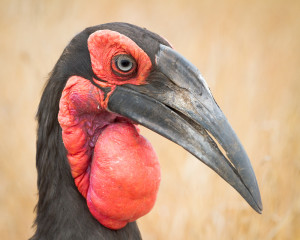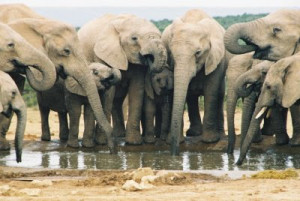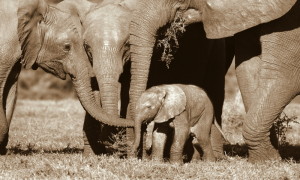My first recollection of seeing a herd of elephants was on my 5th birthday. They were gigantic, wrinkled and grey. I was sitting cross legged on the wooden floor of a viewing platform overlooking a water hole in the heart of the Hwange Game Reserve. The sleeping water reflected the gilt edged clouds scudding happily across the painted sky and noisy doves policed the mopani woodlands, their melodious calls filling the late afternoon. Looking back, I had not appreciated the freedom of space, the warm breeze caressing my hair and the warmth of the wooden slats toasting my bum and bare brown legs. Small midges floated and whirred around my face… it was perfect, and much to my folks amusement, I announced ‘I saw them yesterday.’ And I continued to play with a doll with staring eyes and yellow hair. Well 50 years on, Hwange’s elephants are once again on my mind.

Copy write – Artush
Hwange..A Spectacular Corner Of The Earth
Fingers of sunshine edge over the horizon and breaking free from the thick early morning cloud, they probe deep within the shadows of the teak woodlands. In the warm friendly wash of early morning sunrise the distinct smell of moisture carries on the breeze: a seductive breeze full of promises of much needed rain for this unspoiled bush. Baboons with an excited air of expectation that only the pink wash of dawn brings, stretch, creasing out the night’s wrinkles before leaving the safety of the trees to begin a days foraging. With the leader barking out instructions, the troop ease out of the shadows and into the sunlight, small babies clinging fearlessly to their mother’s undercarriage. The drum roll duet from a pair of Southern ground Horn bills echoes out as the males deep red creased wattle inflates like an old pair of bellows as he welcomes the early African morning. These gigantic birds are monogamous, pairing for up to 30 or 40 years, unless their mate dies.

Photo credit DeLoyd Huenink
Scaly blue headed lizards bask on the exposed rock enjoying the warmth of the African sun on their bellies as well as their backs as one large rolling eye keeps focused on the wide sky looking for predators and the other eye strays onto a squadron of flies as they buzz low over a huge pile of sweet smelling buffalo dung. Hwange is a special corner of the world: untamed bush and spectacular wildlife. Loping giraffe rise up and stand tall against the thorn veld and mopani woodland while prison garbed zebra lower their heads, large teeth mowing and chewing, ears twitching and eyes watchful. Hwange is Zimbabwe’s largest national park and home to in excess of 100 mammal species and covers 14 540 sq km. During the crisp dry winters and droughts, the animals are entirely dependent on a network of artificial dams and pans fed by boreholes. The park’s mix of habitats means an unusual biodiversity offering a sybaritic feast of eclectic bush rich in bird life and 108 different species of animals.

Hwange is home for large herds of lumbering giants and a magic quivers in the air as the subliminal rumble can be felt rather than heard. Elephant family units will split, normally due to a shortage of food in the area. These family units remain united, congregating at watering holes and favourite feeding spots. Meeting up with members from the other unit is also cause for celebration. As vultures whirr high above this sun baked paradise, below the two herds of elephants begin to call out to each other from a quarter of a mile away. Getting closer, they pick up the pace with temporal glands streaming. Once they have spotted each other, they start to run: a large mass of bubbling exuberance and noisy splendor. Making contact through a swirl of golden dust, these mighty creatures embrace: ears flapping, tusks clicking, leaning into and rubbing each other: all the while urinating and defecating. Spinning in circles, they encompass the world with their joy and a cacophony of trumpeting screams and rumbles shred the air. Happiness and joyful is their reunion. These gregarious animals lower their trunks into the watering pan sucking up deep drafts of sweet life giving liquid and quenching their thirst before throwing warm Hwange sand over their backs. Small calves rough and tumble, their wrinkled trunks entwined and their shrill joyful calls filling the air. Their over sized creased coats are smeared with mud and their large Africa shaped ears fan the sultry breeze cooling down their body temperatures. A small herd of buffalo have retreated to the other side of the pan, flaring their nostrils and snorting their defiance. The lords of the land, their large trunks with deep fissures swinging free as they rumble their way back into the African bush…the womb of the universe. The matriarchal herd have formed bonds that have been forged over a life time of 40 to 50 years and all young calves remain protected in the bosom of the family. Young males will branch out tasting independent life at about 15 years of age and females will remain with the herd.

Their relationship within the family rivals that of humans and they could teach the two legged creature a thing or two about family values and loyalty. Elephants show all the best attributes of mankind with few of them displaying our darker sides. They share this paradise with a multitude of different wildlife. While big cats prowl, the kings proud and vibrant mane halos his strong face. His yellow eyes are focused as he crouches low, camouflaged by the bush. These predators work together: a perfect phalanx as the strangled cry of a young buffalo fills the air, and the excited cackle of the hyenas resonate as they close in, ready for battle with their age old enemies. These bush battles are as old as time and the winner takes all.

Today, a much more dangerous force of predators are on the prowl. MAN.
‘According to an undercover wildlife investigator who provided information published in The Star newspaper, the elephant calves are being held at the ZWMA Mtshibi Animal Capture Unit’s holding centre, a few kilometres from Hwange Main Camp, where they’re being vetted for diseases prior to export.
Tourists reported seeing helicopter and ground teams from Zimbabwe Parks and Wildlife Management Authority (ZPWMA) roping the babies after separating them from their mothers by firing shots above the heads of the herd. The calves would be below the age of five and not properly weaned, which reduces their chance of survival.’
This wildlife paradise erupts and tourists become aware of a live horror story taking place as they witness the blatant live capture of baby elephants as they are torn from the safety of the herd. Pulsating blood pushes through veins as these babies hearts pound in fear as their world is ripped apart. The matriarchal herds trumpet in rage as they are chased away by the sharp kkkk of warning shots being fired above their heads from a circling helicopter. A heavy curtain of dust hangs motionless as the net of capture closes in suffocating the small frightened animals. With temporal glands streaming, the captured babies urinate and defecate, their bowels opening in shock and horror, their small trunks lifting to smell the air…wondering where their mothers are. The shutter of freedom comes banging down, turning these bush elephants into ‘captives’ who will, if they survive the trauma now endure a life time of servitude to man. Dazed and confused, they are pushed into a boma at the ZWMA Mtshibi Animal Capture Unit, where they are being vetted for disease prior to …’a life changing journey ahead of them.’
As Dame Daphne Sheldrick said ‘Elephants are indeed more ancient, more complex, and in many ways more sophisticated than man. In terms of Nature they are truly more perfect because they remain within the ordered scheme of Nature and live as Nature intended. They are different to us, honed by natural selection over millennia so they should not be patronised, but rather respected and revered. And of all the animals, perhaps the most respected and revered should be the elephant, for not only is the largest land mammal on earth, but also the most emotionally human.”
Cites have suggested that this is not illegal to export animals….however it is morally wrong. Zimbabwe, we have heard that one of these calves has died. They should never have been taken away from their mothers. This is a disgrace. Please take action and show your support for these sentient animals and the other wildlife involved in this crime. Please take a minute and sign the following petition.











